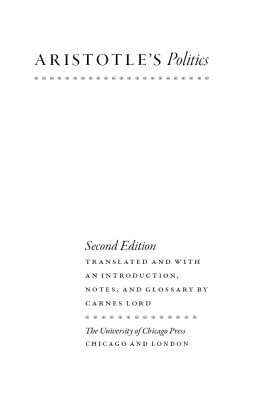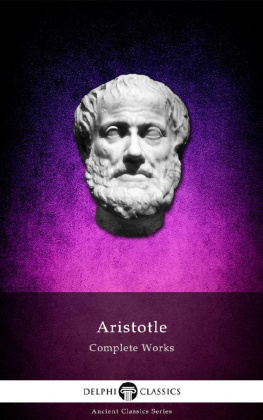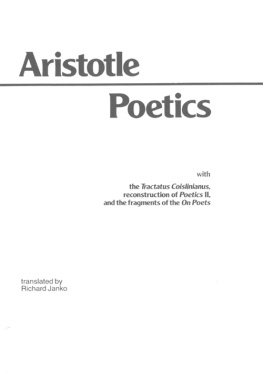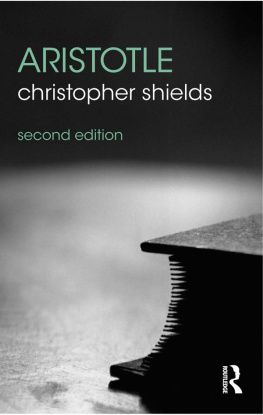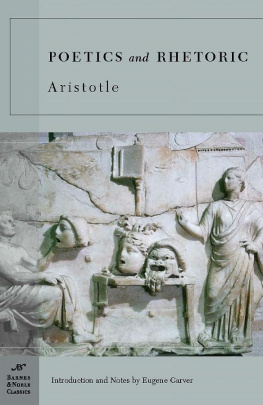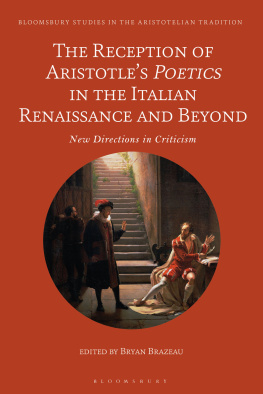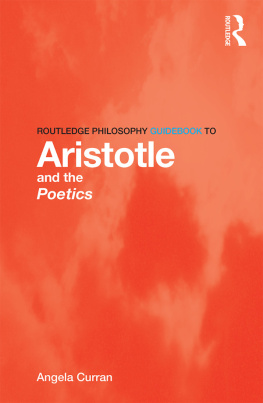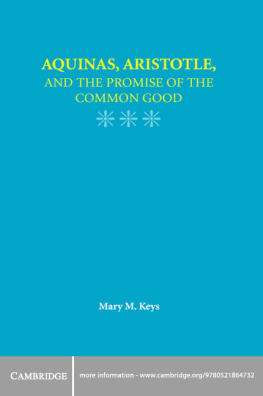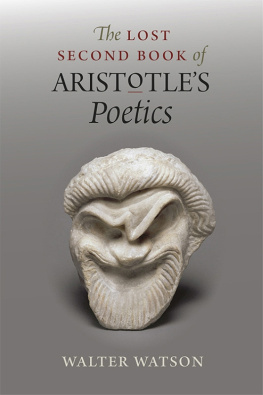Aristotle - Poetics
Here you can read online Aristotle - Poetics full text of the book (entire story) in english for free. Download pdf and epub, get meaning, cover and reviews about this ebook. genre: Science. Description of the work, (preface) as well as reviews are available. Best literature library LitArk.com created for fans of good reading and offers a wide selection of genres:
Romance novel
Science fiction
Adventure
Detective
Science
History
Home and family
Prose
Art
Politics
Computer
Non-fiction
Religion
Business
Children
Humor
Choose a favorite category and find really read worthwhile books. Enjoy immersion in the world of imagination, feel the emotions of the characters or learn something new for yourself, make an fascinating discovery.
Poetics: summary, description and annotation
We offer to read an annotation, description, summary or preface (depends on what the author of the book "Poetics" wrote himself). If you haven't found the necessary information about the book — write in the comments, we will try to find it.
Poetics — read online for free the complete book (whole text) full work
Below is the text of the book, divided by pages. System saving the place of the last page read, allows you to conveniently read the book "Poetics" online for free, without having to search again every time where you left off. Put a bookmark, and you can go to the page where you finished reading at any time.
Font size:
Interval:
Bookmark:
The Project Gutenberg EBook of The Poetics, by Aristotle
This eBook is for the use of anyone anywhere at no cost and with
almost no restrictions whatsoever. You may copy it, give it away or
re-use it under the terms of the Project Gutenberg License included
with this eBook or online at www.gutenberg.org
Title: The Poetics
Author: Aristotle
Commentator: Gilbert Murray
Translator: Ingram Bywater
Release Date: May 2, 2009 [EBook #6763]
Language: English
*** START OF THIS PROJECT GUTENBERG EBOOK THE POETICS ***
Produced by Eric Eldred, and David Widger
Oxford At The Clarendon Press
First Published 1920
Reprinted 1925, 1928, 1932, 1938, 1945, 1947
1951, 1954, 1959. 1962 Printed In Great Britain
ARISTOTLE ON THE ART OF POETRY
In the tenth book of the Republic, when Plato has completed his final burning denunciation of Poetry, the false Siren, the imitator of things which themselves are shadows, the ally of all that is low and weak in the soul against that which is high and strong, who makes us feed the things we ought to starve and serve the things we ought to rule, he ends with a touch of compunction: 'We will give her champions, not poets themselves but poet-lovers, an opportunity to make her defence in plain prose and show that she is not only sweetas we well knowbut also helpful to society and the life of man, and we will listen in a kindly spirit. For we shall be gainers, I take it, if this can be proved.' Aristotle certainly knew the passage, and it looks as if his treatise on poetry was an answer to Plato's challenge.
Few of the great works of ancient Greek literature are easy reading. They nearly all need study and comment, and at times help from a good teacher, before they yield up their secret. And the Poetics cannot be accounted an exception. For one thing the treatise is fragmentary. It originally consisted of two books, one dealing with Tragedy and Epic, the other with Comedy and other subjects. We possess only the first. For another, even the book we have seems to be unrevised and unfinished. The style, though luminous, vivid, and in its broader division systematic, is not that of a book intended for publication. Like most of Aristotle's extant writing, it suggests the MS. of an experienced lecturer, full of jottings and adscripts, with occasional phrases written carefully out, but never revised as a whole for the general reader. Even to accomplished scholars the meaning is often obscure, as may be seen by a comparison of the three editions recently published in England, all the work of savants of the first eminence, (1) or, still more strikingly, by a study of the long series of misunderstandings and overstatements and corrections which form the history of the Poetics since the Renaissance.
(1) Prof. Butcher, 1895 and 1898; Prof. Bywater, 1909; and Prof. Margoliouth, 1911.
But it is of another cause of misunderstanding that I wish principally to speak in this preface. The great edition from which the present translation is taken was the fruit of prolonged study by one of the greatest Aristotelians of the nineteenth century, and is itself a classic among works of scholarship. In the hands of a student who knows even a little Greek, the translation, backed by the commentary, may lead deep into the mind of Aristotle. But when the translation is used, as it doubtless will be, by readers who are quite without the clue provided by a knowledge of the general habits of the Greek language, there must arise a number of new difficulties or misconceptions.
To understand a great foreign book by means of a translation is possible enough where the two languages concerned operate with a common stock of ideas, and belong to the same period of civilization. But between ancient Greece and modern England there yawn immense gulfs of human history; the establishment and the partial failure of a common European religion, the barbarian invasions, the feudal system, the regrouping of modern Europe, the age of mechanical invention, and the industrial revolution. In an average page of French or German philosophy nearly all the nouns can be translated directly into exact equivalents in English; but in Greek that is not so. Scarcely one in ten of the nouns on the first few pages of the Poetics has an exact English equivalent. Every proposition has to be reduced to its lowest terms of thought and then re-built. This is a difficulty which no translation can quite deal with; it must be left to a teacher who knows Greek. And there is a kindred difficulty which flows from it. Where words can be translated into equivalent words, the style of an original can be closely followed; but no translation which aims at being written in normal English can reproduce the style of Aristotle. I have sometimes played with the idea that a ruthlessly literal translation, helped out by bold punctuation, might be the best. For instance, premising that the words poesis, poetes mean originally 'making' and 'maker', one might translate the first paragraph of the Poetics thus:
MAKING: kinds of making: function of each, and how the Myths ought to be put together if the Making is to go right.
Number of parts: nature of parts: rest of same inquiry.
Begin in order of nature from first principles.
Epos-making, tragedy-making (also comedy), dithyramb-making (and most fluting and harping), taken as a whole, are really not Makings but Imitations. They differ in three points; they imitate (a) different objects, (b) by different means, (c) differently (i.e. different manner).
Some artists imitate (i.e. depict) by shapes and colours. (Obs. sometimes by art, sometimes by habit.) Some by voice. Similarly the above arts all imitate by rhythm, language, and tune, and these either (1) separate or (2) mixed.
Rhythm and tune alone, harping, fluting, and other arts with same effecte.g. panpipes.
Rhythm without tune: dancing. (Dancers imitate characters, emotions, and experiences by means of rhythms expressed in form.)
Language alone (whether prose or verse, and one form of verse or many): this art has no name up to the present (i.e. there is no name to cover mimes and dialogues and any similar imitation made in iambics, elegiacs, &c. Commonly people attach the 'making' to the metre and say 'elegiac-makers', 'hexameter-makers,' giving them a common class-name by their metre, as if it was not their imitation that makes them 'makers').
Such an experiment would doubtless be a little absurd, but it would give an English reader some help in understanding both Aristotle's style and his meaning.
For example, their enlightenment in the literal phrase, 'how the myths ought to be put together.' The higher Greek poetry did not make up fictitious plots; its business was to express the heroic saga, the myths. Again, the literal translation of poetes, poet, as 'maker', helps to explain a term that otherwise seems a puzzle in the Poetics. If we wonder why Aristotle, and Plato before him, should lay such stress on the theory that art is imitation, it is a help to realize that common language called it 'making', and it was clearly not 'making' in the ordinary sense. The poet who was 'maker' of a Fall of Troy clearly did not make the real Fall of Troy. He made an imitation Fall of Troy. An artist who 'painted Pericles' really 'made an imitation Pericles by means of shapes and colours'. Hence we get started upon a theory of art which, whether finally satisfactory or not, is of immense importance, and are saved from the error of complaining that Aristotle did not understand the 'creative power' of art.
Font size:
Interval:
Bookmark:
Similar books «Poetics»
Look at similar books to Poetics. We have selected literature similar in name and meaning in the hope of providing readers with more options to find new, interesting, not yet read works.
Discussion, reviews of the book Poetics and just readers' own opinions. Leave your comments, write what you think about the work, its meaning or the main characters. Specify what exactly you liked and what you didn't like, and why you think so.



